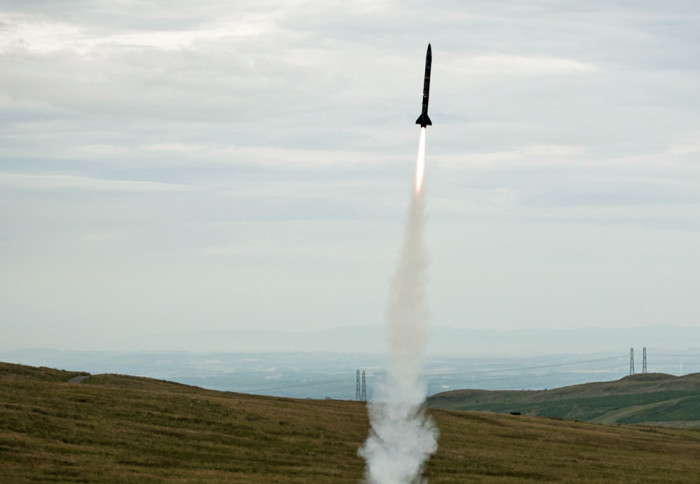Imperial students celebrate first test launch in space rocket programme

Students at Imperial College London are celebrating a successful test rocket launch from rural Scotland.
The launch is a big step for the team, which includes students from ten departments and three faculties across the College, who are aiming to be the first university team to send a reusable rocket into space.
The student-led Karman Space Programme aims to design, build and launch a rocket to pass the Karman Line – the internationally recognised boundary to space, roughly 100km above sea level – and then successfully return it to Earth to be reused.
The first test launch, which tested the recovery and avionics systems of the rocket and verified that it was reusable, took place in Ayrshire, Scotland shortly before 7pm on Saturday 16 July 2022.
“As a team, they are so enthusiastic and there is a tremendous amount of talent there. They are very mature.” Dr Ali Baghdadi Advisor for the Karman Space Programme
Aeronautical Engineering students Shapol M., Shakil Perera, Tian Fang and Mohammad Kapadia started the space programme last summer after first discussing the idea as part of an end-of-year project.
They have since recruited students from across the university, as well as a team of academic supervisors and advisors, including Computing alumnus Dr Ali Baghdadi.
Dr Baghdadi, who enjoyed building model rockets as a child, has mentored the student team, helped to raise sponsorship and was present at the test launch.
He said: “The founders reached out to me with their idea and we started collaboration. I guided them on how to get structure as an organisation and introduced various concepts such as design thinking, project management and budgeting.
“As a team, they are so enthusiastic and there is a tremendous amount of talent there. They are very mature.”

After some technical challenges and delays, the 2.2metre Nebula rocket successfully took off from Fairlie Moor, North Ayrshire, on Saturday, accelerating very rapidly amid plumes of smoke and cheers from dozens of student, climbing to an altitude of some 16,000 feet.
Operations lead Dyuti Chakraborty said the team would now be able to gather important data about how the rocket functioned.
She said: “Everyone is ecstatic and just so relieved that we could do it. We have been working on this rocket for a very long time and, for many of us, it’s our first rocket that we’ve ever designed or made.
“It’s been quite a nerve-wracking couple of days.”
"We have been working on this rocket for a very long time and, for many of us, it’s our first rocket that we’ve ever designed or made." Dyuti Chakraborty Operations lead at the Karman Space Programme
Over the next two years, the team will work on building and launching a series of prototypes, aiming at different altitudes to refine their design and prepare for the launch of a 100km altitude rocket in 2024.
The final rocket and their early prototypes will be researched and designed by the team, with most elements being built at the College’s White City Campus, including the Advanced Hackspace.
Some elements, including the rocket’s liquid engine, will be manufactured by British aerospace manufacturing company GKN. One of the project’s sponsors, Dassault Systèmes, has supported the team to simulate their designs.
Main image credit: Fraser Cameron/Imperial College London.
Article text (excluding photos or graphics) © Imperial College London.
Photos and graphics subject to third party copyright used with permission or © Imperial College London.
Reporter
Conrad Duncan
Communications Division
Ollie Wilson
Communications Division